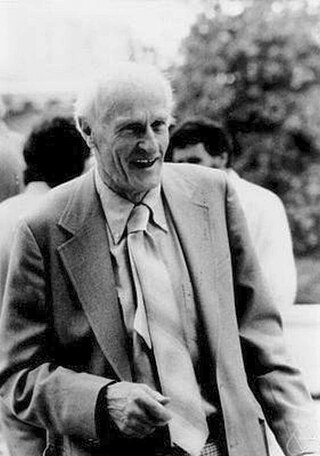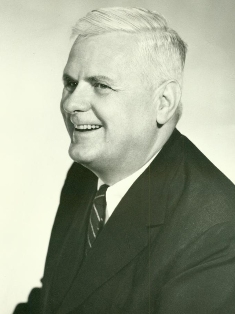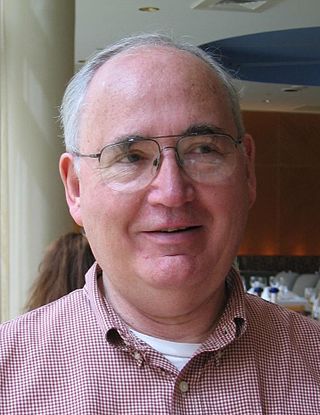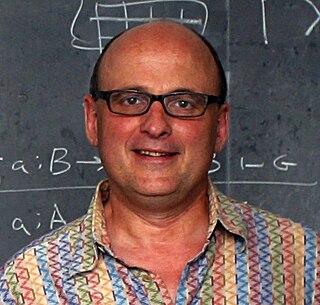In computability theory, the Church–Turing thesis is a thesis about the nature of computable functions. It states that a function on the natural numbers can be calculated by an effective method if and only if it is computable by a Turing machine. The thesis is named after American mathematician Alonzo Church and the British mathematician Alan Turing. Before the precise definition of computable function, mathematicians often used the informal term effectively calculable to describe functions that are computable by paper-and-pencil methods. In the 1930s, several independent attempts were made to formalize the notion of computability:
In theoretical computer science and formal language theory, a regular language is a formal language that can be defined by a regular expression, in the strict sense in theoretical computer science.

Stephen Cole Kleene was an American mathematician. One of the students of Alonzo Church, Kleene, along with Rózsa Péter, Alan Turing, Emil Post, and others, is best known as a founder of the branch of mathematical logic known as recursion theory, which subsequently helped to provide the foundations of theoretical computer science. Kleene's work grounds the study of computable functions. A number of mathematical concepts are named after him: Kleene hierarchy, Kleene algebra, the Kleene star, Kleene's recursion theorem and the Kleene fixed-point theorem. He also invented regular expressions in 1951 to describe McCulloch-Pitts neural networks, and made significant contributions to the foundations of mathematical intuitionism.

Alonzo Church was an American mathematician, computer scientist, logician, and philosopher who made major contributions to mathematical logic and the foundations of theoretical computer science. He is best known for the lambda calculus, the Church–Turing thesis, proving the unsolvability of the Entscheidungsproblem, the Frege–Church ontology, and the Church–Rosser theorem. Alongside his doctoral student Alan Turing, Church is considered one of the founders of computer science.

Dana Stewart Scott is an American logician who is the emeritus Hillman University Professor of Computer Science, Philosophy, and Mathematical Logic at Carnegie Mellon University; he is now retired and lives in Berkeley, California. His work on automata theory earned him the Turing Award in 1976, while his collaborative work with Christopher Strachey in the 1970s laid the foundations of modern approaches to the semantics of programming languages. He has also worked on modal logic, topology, and category theory.

Metamathematics is the study of mathematics itself using mathematical methods. This study produces metatheories, which are mathematical theories about other mathematical theories. Emphasis on metamathematics owes itself to David Hilbert's attempt to secure the foundations of mathematics in the early part of the 20th century. Metamathematics provides "a rigorous mathematical technique for investigating a great variety of foundation problems for mathematics and logic". An important feature of metamathematics is its emphasis on differentiating between reasoning from inside a system and from outside a system. An informal illustration of this is categorizing the proposition "2+2=4" as belonging to mathematics while categorizing the proposition "'2+2=4' is valid" as belonging to metamathematics.

Samson Abramsky is a British computer scientist who is a Professor of Computer Science at University College London. He was previously the Christopher Strachey Professor of Computing at Wolfson College, Oxford, from 2000 to 2021.

László Kalmár was a Hungarian mathematician and Professor at the University of Szeged. Kalmár is considered the founder of mathematical logic and theoretical computer science in Hungary.

Robert William Harper, Jr. is a computer science professor at Carnegie Mellon University who works in programming language research. Prior to his position at Carnegie Mellon, Harper was a research fellow at the University of Edinburgh.

Frank Pfenning is a German-American professor of computer science, adjunct professor in philosophy, and head of the Computer Science Department at Carnegie Mellon University.
The ACM–IEEE Symposium on Logic in Computer Science (LICS) is an annual academic conference on the theory and practice of computer science in relation to mathematical logic. Extended versions of selected papers of each year's conference appear in renowned international journals such as Logical Methods in Computer Science and ACM Transactions on Computational Logic.
In computer science and recursion theory the McCarthy Formalism (1963) of computer scientist John McCarthy clarifies the notion of recursive functions by use of the IF-THEN-ELSE construction common to computer science, together with four of the operators of primitive recursive functions: zero, successor, equality of numbers and composition. The conditional operator replaces both primitive recursion and the mu-operator.

Moshe Ya'akov Vardi is an Israeli mathematician and computer scientist. He is the Karen Ostrum George Distinguished Service Professor in Computational Engineering at Rice University, United States. and a faculty advisor for the Ken Kennedy Institute. His interests focus on applications of logic to computer science, including database theory, finite model theory, knowledge of multi-agent systems, computer-aided verification and reasoning, and teaching logic across the curriculum. He is an expert in model checking, constraint satisfaction and database theory, common knowledge (logic), and theoretical computer science.
The history of the Church–Turing thesis ("thesis") involves the history of the development of the study of the nature of functions whose values are effectively calculable; or, in more modern terms, functions whose values are algorithmically computable. It is an important topic in modern mathematical theory and computer science, particularly associated with the work of Alonzo Church and Alan Turing.

Rajeev Alur is an American professor of computer science at the University of Pennsylvania who has made contributions to formal methods, programming languages, and automata theory, including notably the introduction of timed automata and nested words.
Dexter Campbell Kozen is an American theoretical computer scientist. He is Professor Emeritus and Joseph Newton Pew, Jr. Professor in Engineering at Cornell University.
The Machtey Award is awarded at the annual IEEE Symposium on Foundations of Computer Science (FOCS) to the author(s) of the best student paper(s). A paper qualifies as a student paper if all authors are full-time students at the date of the submission. The award decision is made by the Program Committee.
Leonid Libkin is a computer scientist who works in data management, in particular in database theory, and in logic in computer science.

Prakash Panangaden is an American/Canadian computer scientist noted for his research in programming language theory, concurrency theory, Markov processes and duality theory. Earlier he worked on quantum field theory in curved space-time and radiation from black holes. He is the founding Chair of the ACM Special Interest Group on Logic and Computation.
ACM SIGLOG or SIGLOG is the Association for Computing Machinery Special Interest Group on Logic and Computation. It publishes a news magazine, and has the annual ACM–IEEE Symposium on Logic in Computer Science (LICS) as its flagship conference. In addition, it publishes an online newsletter, the SIGLOG Monthly Bulletin, and "maintains close ties" with the related academic journal ACM Transactions on Computational Logic.










